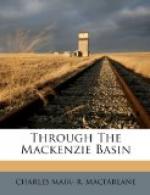The country passed through hitherto was rolling, hilly, and densely forested, but, alas, with prostrate trunks and fire-blasted “rampikes,” which ranged in all directions in desolate profusion. The timber was Banksian pine, spruce, poplar and birch, much of it merchantable, but not of large size. It was pitiful to see so much wealth destroyed by recent fires, and that, too, at the possible opening of an era of real value in the near future. The greatest destruction was evidently on the north side of the river, but the south had not escaped.
As regards the soil in these parts, it was, so far, impossible to speak favourably. The hunters described the inland country as a wilderness of sand-hills, surrounded by quaking-bogs, muskegs and soft meadows. Judging by exposures on the river bank, there are, here and there, fertile areas which may yet be utilized; but probably the best thing that could happen to that part of the country would be a great clearing fire to complete the destruction of its dead timber and convert its best parts into prairie and a summer range for cattle.
We were now approaching a portion of the river where the difficulties of getting on were great. The men had to cope with the swift current, bordered by a series of steep gumbo slides, where the tracking was hazardous; where great trees slanted over the water, tottering to their fall, or deep pits and fissures gaped in the festering clay, into which the men often plunged to their arm-pits. It was horrible to look upon. The chain-gang, the galley-slaves, how often the idea of them was recalled by that horrid pull! Yet onward they went, with teeth set and hands bruised by the rope, surmounting difficulty after difficulty with the pith of lions.
At last a better region was reached, with occasionally a better path. Here the destruction by fire had been stayed, the country improved, and the forest outlines became bold and noble. Hour by hour we crept along a like succession of majestic bends of the river, not yet flushed by the summer freshet, but flowing with superb volume and force. Fully ten miles were made that day, the men tracking like Trojans through water and over difficult ground, but fortunately free from mosquitoes, the constant head winds keeping these effectually down. The cool weather in like manner kept the water down, for it is in this month that the freshet from the Rocky Mountains generally begins, filling the channel bank-high, submerging the tracking paths, and bearing upon its foaming surface such a mass of uprooted trees and river trash that it is almost impossible to make head against it.
The next morning opened dry and pleasant, but with a milky and foreboding sky. Again the boats were in motion, passing the Pusquatenao, or Naked Hill, beyond which is the Echo Lake—Katoo Sakaigon—where a good many Indians lived, having a pack-trail thereto from the river.
The afternoon proved to be hot, the clouds cumulose against a clear, blue sky, with occasional sun-showers. The tracking became better for a time, the lofty benches decreasing in height as we ascended. Innumerable ice-cold creeks poured in from the forest, all of a reddish-yellow cast, and the frequent marks on trees, informing passing hunters of the success of their friends, and the number of stages along the shore for drying meat, indicated a fine moose country.




